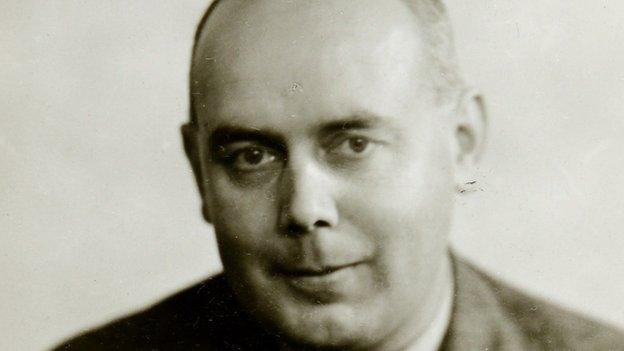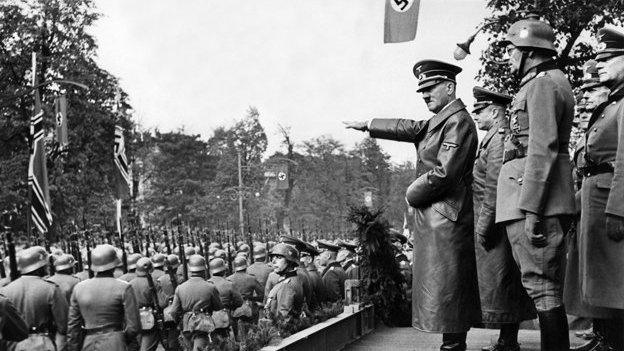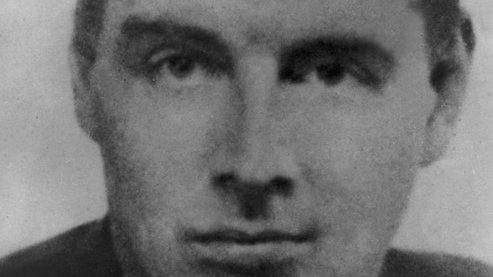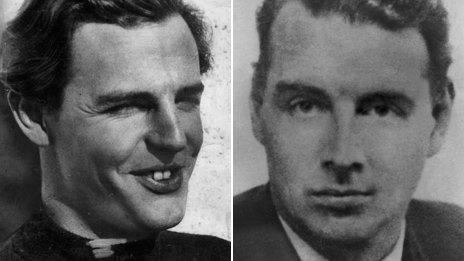MI5's star wartime agent worked as bank clerk
- Published

MI5 agent Eric Roberts used the alias Jack King
A wartime MI5 agent who revealed a network of UK-based Nazi sympathisers worked as a suburban bank clerk.
The agent who pretended to be a Gestapo officer was actually Eric Roberts, according to files released on Friday by the National Archives.
He worked under the alias of Jack King and helped identify people willing to pass secrets to the enemy.
Earlier in the year files were released about Mr King, which fuelled widespread speculation as to his real identity.
The new files show Mr Roberts - who is described as a "genius spy" - as a father of two, who lived near Epsom racecourse in Surrey.
Jiu-jitsu
They suggest he was effectively able to control the activities of hundreds of clandestine traitors, known as "fifth columnists", and therefore neutralise the threat to the UK's war effort.
The transcripts detail how Mr Roberts convinced pro-Germans that he was a genuine Nazi spy, able to look at English maps in detail with would-be fifth columnists, and apparently identify potential targets for Nazi attack.
Eric Roberts posed as an undercover Gestapo officer to gather information
They also indicate that "Jack King" came from a modest background, with little apparent qualification for espionage.
He worked for a branch of the then Westminster Bank in central London, and had visited Germany, but only on holiday, twice in the 1930s - and did not speak German especially well.
He was also a jiu-jitsu enthusiast and a member of the Anglo-Japanese Judo Club.
There has been much speculation about Jack King's real identity, and it was suggested he was former MI5 officer-turned-author John Bingham - who was reportedly an inspiration for John Le Carre's character George Smiley.
Mr Roberts was well known to MI5, suggesting he had already done some work for them. The file states that He was "thoroughly familiar" with the various pro-Nazi organisations in the UK, and MI5's top agent runner Maxwell Knight had "the highest opinion of his character and abilities".
Atom bomb
In 1940 MI5 requested Mr Roberts to be released from his job, and his employers were genuinely surprised by this.
One manager wrote: "What we would like to know here is what are the particular and especial qualifications of Mr Roberts - which we have not been able to perceive - for some particular work of national military importance which would take him away from his normal military call-up in October?"
It was arranged that Mr Roberts could return to the bank after the war, but it is not clear from the file whether he did.
The newly released files at the National Archives in Kew, west London, also revealed that the US's Federal Bureau of Investigation (FBI) feared that atom bomb pioneer Robert Oppenheimer would use a visit to the UK to defect to Russia.
Mr Oppenheimer led the US-British Manhattan Project to develop the world's first atomic weapon, but after the war was over, he came under investigation in the US for his left-wing sympathies.
According to the files, in 1954 the FBI contacted MI5 urging it to put the scientist under surveillance if he entered the UK.
The files also confirm that two of the UK's most prominent Marxist intellectuals of the post-war era the historians Eric Hobsbawm and Christopher Hill, were subjected to surveillance by MI5, and made no secret of their communist sympathies.
- Published28 February 2014

- Published17 January 2014

- Published26 October 2012
